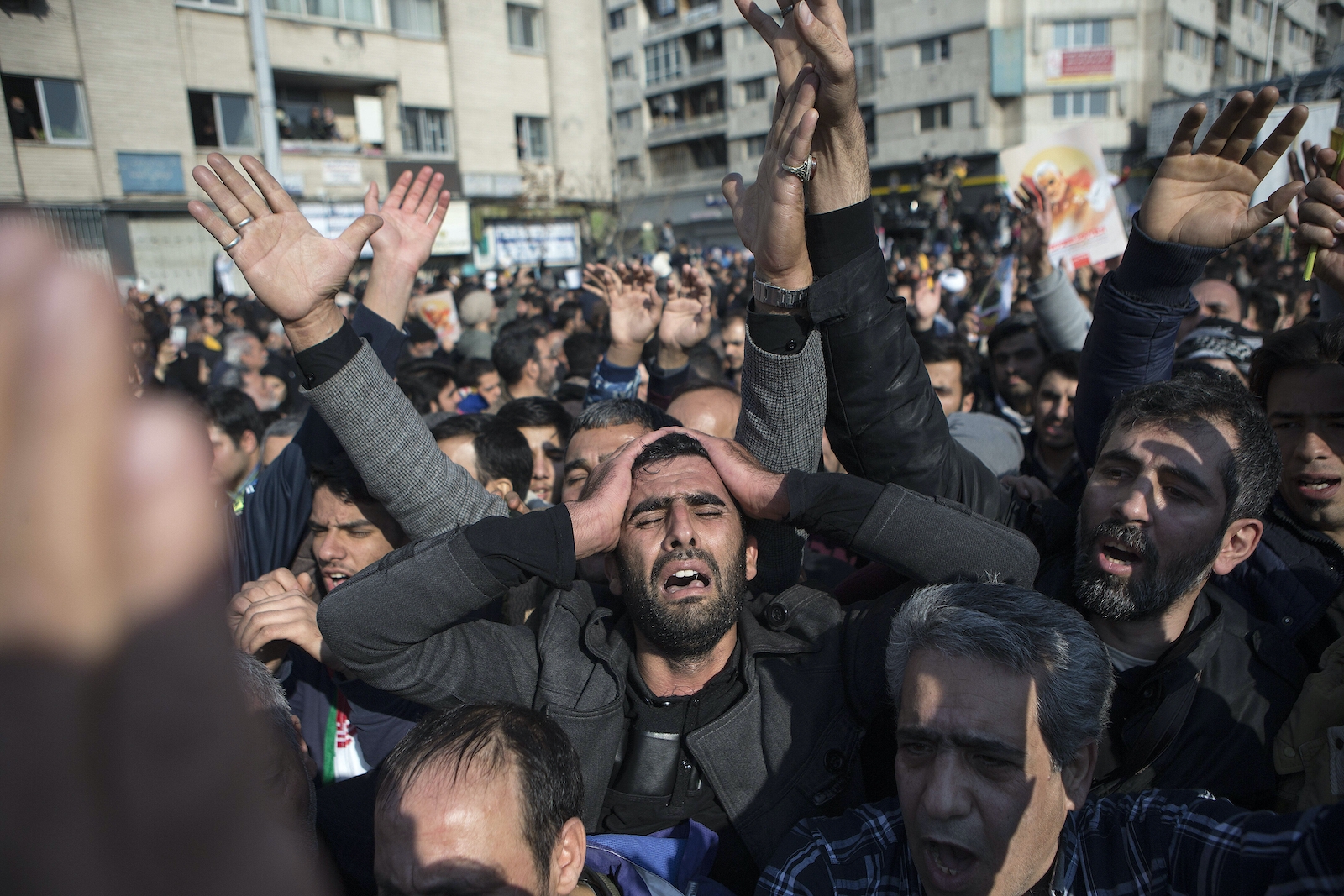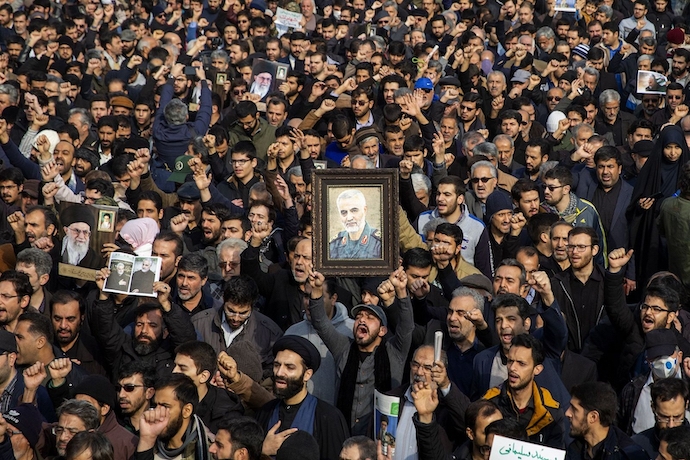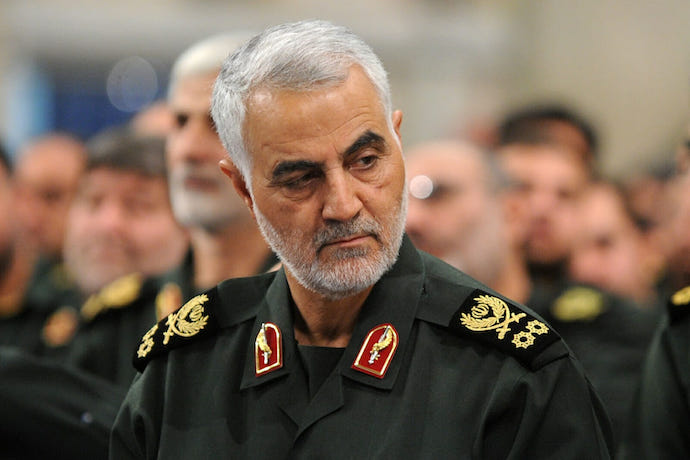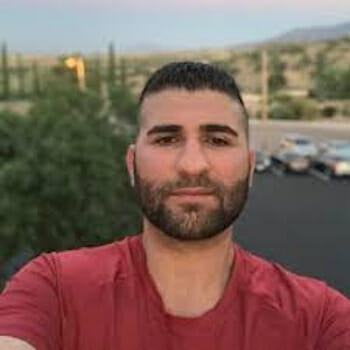
From Saving Assad to Reshaping the Middle East, Soleimani Left a Lasting Legacy
Gen. David Petraeus in a report from Iraq to the White House once wrote that Qassem Soleimani, Iran’s top general, was “truly evil.” This is according to Soleimani’s 2013 New Yorker profile by Dexter Filkins. Soleimani proved to be Iran’s most lethal weapon in the Middle East following the U.S. invasion of Iraq in 2003. Over the years, he helped save Bashar al-Assad’s regime in Syria and built a network of Shi’a militias whose loyalty to Iran and its agenda for the Middle East is beyond doubt. Soleimani achieved these objectives by being a ruthless and merciless killer whose forces continue to wreak havoc not only in the Middle East but across the world.
Crises tend to forge ordinary men and women into extraordinary leaders. This is what happened to Soleimani. Soleimani was the commander of the Quds Force, the external wing of the Islamic Revolutionary Guard Corps (IRGC), which focuses on special and covert operations outside Iran until he was killed in early 2020.
The Quds Force is essentially a blend of the Central Intelligence Agency and the Joint Special Operations Command. Soleimani was the main architect of Iran’s military policies and played a pivotal role in the country’s activities in Iraq, Syria, Lebanon, and Yemen.
Soleimani was also Iran’s most formidable military commander and Supreme Leader Ayatollah Ali Khamenei’s beloved general. Additionally, Soleimani was the second most important political figure after Khamenei in Iran. Which is why Khamenei awarded Soleimani with the Order of Zulfiqar in March 2019, which is the country’s most prestigious award, and no military commander had received it since Iran’s revolution in 1979.
Soleimani sprang up from humble origins. He was born in the village of Qanat-e-Malek in Iran’s Kerman Province on March 11, 1957. From an early age, Soleimani demonstrated skills that are inherent in most great leaders—determination, tenacity, optimism, and an ability to prevail over brick walls. When Soleimani was just 13 years old, his father got trapped in a debt he could not pay. Filkins writes, his “father, like many other farmers, took out an agricultural loan from the government of the Shah. He owed nine hundred toman—about a hundred dollars at the time—and couldn’t pay it back.” His father’s debt prompted Soleimani to leave his village for the city of Kerman along with a relative, whose father was in a similar situation.

In a brief memoir that he published, Soleimani narrates that at nights he could not fall asleep with “the sadness of thinking that government agents were coming to arrest our fathers.” Working for only two tomans a day, Soleimani returned to the village to clear his father’s debt.
Soleimani would have likely remained an ordinary individual had it not been for the Islamic Revolution of 1979, which dethroned Mohammad Reza Pahlavi—a major U.S. ally—in February of that year. Ayatollah Ruhollah Khomeini took over the country and turned it into an Islamic Republic. Several months later, Saddam Hussein invaded western Iran on September 22, 1980, to prevent Khomeini from spreading his revolutionary ideals across the region; this was evidently a major concern for Hussein given that most Iraqis—like Iranians—are Shi’a Muslims.
Once the machinery of the Iraq-Iran War, which lasted until 1988, had been fully set in motion, Soleimani joined the IRGC to leave his mark on the country’s military and political history. The IRGC had been established to prevent a coup against the regime. Soleimani—by most accounts—received only 45 days of military training before he left for combat. Soleimani had a meteoric rise within the IRGC mostly because of his dedication to the mission and the bravery he displayed on the battlefield. “[Soleimani] had a reputation for bravery and elan, especially as a result of reconnaissance missions he undertook behind Iraqi lines,” Filkins writes.
Martyr Soleimani is more dangerous for his enemies than General Soleimani.
— Khamenei.ir (@khamenei_ir) January 2, 2022
Soleimani returned from “several missions bearing a goat, which his soldiers slaughtered and grilled.” Iraqis admired Soleimani for this and he was given the nickname, the “goat thief.” Throughout his life—even when he became a senior commander within the IRGC—Soleimani never abandoned the Churchillian trait of visiting the frontlines and demonstrating courage in the face of immense personal risk. Winston Churchill said: “Courage is rightly esteemed the first of human qualities because it is the quality which guarantees the others.” Time and again and upon taking over the Quds Force in 1998, Soleimani undertook covert and clandestine missions that proved that every line and feature on his face represented Machiavellian ruthlessness.
Soleimani proved to be an agent of terror and destruction around the world, particularly across the Middle East. For the United States and its allies—mainly Israel and Saudi Arabia—Soleimani proved to be the penthouse of geopolitical troubles. Iran helped establish Hezbollah in the early 1980s during the Lebanese Civil War. It has been using Hezbollah to stage deadly attacks outside the region. American and Argentinian authorities attribute the Israeli embassy bombing in Buenos Aires in 1992 that killed 29 people to Hezbollah.
In 1994, an attack on a Jewish center in Buenos Aires killed 85 people, which is also attributed to Hezbollah and Iran. Such was the handiwork of the Quds Force that Soleimani built; the organization is omnipresent and enjoys a wide and far reach. The organization has also been involved in other nefarious activities, such as financing terror groups, money laundering, sabotage, espionage, assassinations, intelligence collection, and covert operations. While for the rest of the world, Soleimani was a steward of terror, for Iran he was the embodiment of heroism. He was a shrewd political operator who rose through the ranks and influenced every major foreign policy and military decision.
Leadership is universal. Individuals—regardless of religion, geographic location, cultural background, and upbringing—can evolve into great leaders. While integrity in a leader matters greatly, ethics—especially at the international level and involving a country’s national interests—does not. In this way, Soleimani shared significant similarities with Soviet Field Marshal Gregory Zhukov. Zhukov was the most consequential military leader of the Soviet Union. He oversaw the most preeminent battles of World War II over the Germans. Following Joseph Stalin’s death, Zhukov’s public stature became more prominent throughout the Soviet Union. What an Indian diplomat—Krisha Menon—said of Zhukov in the 1950s aptly applies to Soleimani: “No star shone in the Russian firmament after Stalin’s death with greater lustre than Zhukov’s.” No political or military leader had penetrated the Iranian moral imagination and public consciousness more than Soleimani. This includes Ayatollah Ali Khamenei. Like Zhukov, who was the only general who could speak openly to Joseph Stalin, Soleimani had managed to deeply ingratiate himself with Khamenei.

This was primarily due to the kind of person one would find in Soleimani. Effective military leaders must also be shrewd political operators. Retired Gen. Stanley McChrystal writes in Foreign Policy: “His brilliance, effectiveness, and commitment to his country have been revered by his allies and denounced by his critics in equal measure. What all seem to agree on, however, is that the humble leader’s steady hand has helped guide Iranian foreign policy for decades—and there is no denying his successes on the battlefield. Suleimani [was] arguably the most powerful and unconstrained actor in the Middle East” until his death.
In the United States’ invasion of Afghanistan in 2001 and of Iraq in 2003, Soleimani located opportunities to further Iran’s national interests and handicap Washington’s. From the time Soleimani joined the Iraq-Iran War when he was 23 years old, the argument can be made that he was a wartime leader. “Great wartime leaders are often deeply influenced in their thinking by major political events that happened in their youth.” For Soleimani, it was the war with Iraq and the United States’ support of Hussein. Soleimani knew that he could not engage the United States military directly. Therefore, he resorted to guerilla tactics and suicide bombing attacks against Washington and its military and diplomatic personnel in Iraq. By all estimates, Soleimani and his men were responsible for killing hundreds of U.S. troops in Iraq beginning in 2004.
Soleimani—in the years that ensued—turned several Arab capitals of the Middle East into Iran’s sphere of influence. Tehran has cultivated deep relations and built a network of deadly proxies in Lebanon with Hezbollah, in Yemen with Al-Houthi Shi’a rebels, in Iraq with the Popular Mobilization Units, and in the Gaza Strip with Palestinian militant groups, including Hamas and the Palestinian Islamic Jihad (PIJ). While Russia receives credit for saving Bashar al-Assad in Syria, the Syrian government would have long collapsed without Soleimani and the IRGC.
The more the U.S. hesitated about targeting Soleimani and the IRGC over the fear of an escalation in the Middle East, the more emboldened Soleimani became. Soleimani had grown too arrogant and could not possibly think that the U.S. would resort to targeted assassinations. In early 2008, Soleimani even went as far as asking former Iraqi President Jalal Talabani to hand his mobile phone to Gen. David Petraeus. A text from Soleimani to Petraeus on Talabani’s phone read: “Dear General Petraeus, you should know that I, Qassem Suleimani, control the policy for Iran with respect to Iraq, Lebanon, Gaza, and Afghanistan. And indeed, the ambassador in Baghdad is a Quds Force member. The individual who’s going to replace him is a Quds Force member.”
Soleimani operated under the mistaken assumption that the U.S. would continue to tolerate his destructive activities no matter how far he went. In January 2020, following major protests and an attack on Washington’s embassy in Baghdad, former President Donald Trump ordered the killing of Soleimani and several prominent Iraqi Shi’a militia leaders, including Abu Mahdi al-Muhandis, in a drone strike outside Baghdad’s international airport. Soleimani’s killing “was the most consequential event in the Middle East since the invasion of Iraq. Its consequences will reverberate through the region for several years.”
On the second anniversary of Soleimani’s death in January, weaponized drones targeted Baghdad’s airport, rockets were hurled at Ain al-Assad Airbase in Iraq’s Al-Anbar Governorate, and the Al-Houthi rebels seized an Emirati-flagged ship in the Red Sea. Cyberattacks—which are believed to have originated in Iran—targeted two Israeli newspapers. Khamenei tweeted on January 2nd: “Martyr Soleimani is more dangerous for his enemies than General Soleimani.”
Soleimani was almost an indispensable leader for Iran. He made Iran matter in the region. Iran is a force to be reckoned with across the Middle East. He was a military tactics master. He was a strategic genius. He was Machiavellian in every sense of the word. He loved his country. It was not religion or ideology that drove him but nationalism and love of the fight. He lived to revive Iran’s ancient standing and stature as a great power. When one studies Soleimani, one cannot overlook the fact that he possessed all the ingredients that are found in great leaders. He was calm in crises. He took care of his soldiers. He stood for what he believed in. He was fearless. He was willing to die for a cause he believed in. He ultimately did. Soleimani—the statement cannot be ignored—was the greatest man of action born in Iran since Khomeini.
The views expressed in this article are those of the author alone and do not necessarily reflect those of any institutions with which the author is associated.
